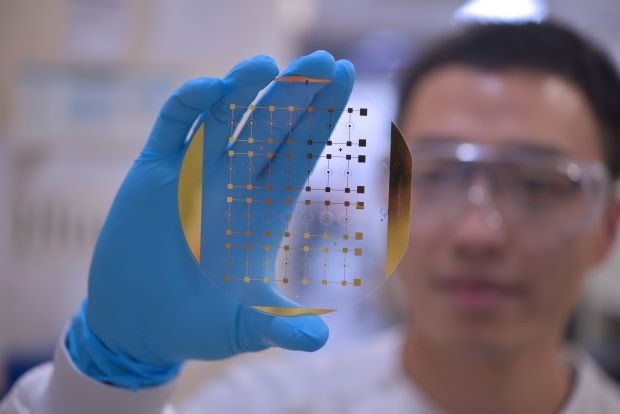University of Queensland researchers have designed a device that uses a simple blood test to detect early stage lung cancer.
 Quan Zhou holds up the device his laboratory is using to explore faster, more accurate methods of diagnosis. Image: The University of Queensland.
Quan Zhou holds up the device his laboratory is using to explore faster, more accurate methods of diagnosis. Image: The University of Queensland.
Dr Richard Lobb and Quan Zhou from UQ’s Australian Institute for Bioengineering and Nanotechnology said the diagnostic device could help patients begin treatment and get ahead of the disease before it spreads.
"Lung cancer is the most common cause of cancer death in Australia, claiming the lives of almost 9000 people each year,” Dr Lobb said.
“Despite its prevalence, the initial detection and screening process for the disease can be drawn out and expensive, involving scans, imaging tests and biopsy procedures.
“The technology we’ve developed is non-invasive and can detect very small lung cancer nodules to hopefully catch the disease in the first stage.”
The nanodevice analyses the patient’s blood sample, looking for a particular biomarker – the sugars that coat the tiny messenger particles known as extracellular vesicles (EVs).
“These sugar molecules, or glycans, serve as excellent biomarkers because the sugar code on a cancer cell is different to a normal cell,” Dr Lobb said.
“A drop of blood can be all that’s needed to alert clinicians to the presence of small lung cancer nodules and allow intervention while the disease is in its early stages,” Dr Lobb said.
A clinical study involving 40 patients found the technology successfully differentiated patients with early-stage malignant lung nodules from those with benign lung nodules.
The results show the potential to use EV glycans to diagnose other diseases non-invasively. This device, and a simple blood test, could help clinicians step in before more intensive scanning or treatments or drug regimes are needed.”
Quan Zhou, UQ’s Australian Institute for Bioengineering and Nanotechnology
The nanodevice was designed in the lab of ARC Laureate and AIBN senior group leader Professor Matt Trau, with AIBN scholars Xueming Niu, Dr Alain Wuethrich and Dr Zhen Zhang contributing to the research.
The research paper was published in Advanced Science.
Source:
Journal reference:
Zhou, Q., et al. (2024). Glycan Profiling in Small Extracellular Vesicles with a SERS Microfluidic Biosensor Identifies Early Malignant Development in Lung Cancer. Advanced Science. doi.org/10.1002/advs.202401818.